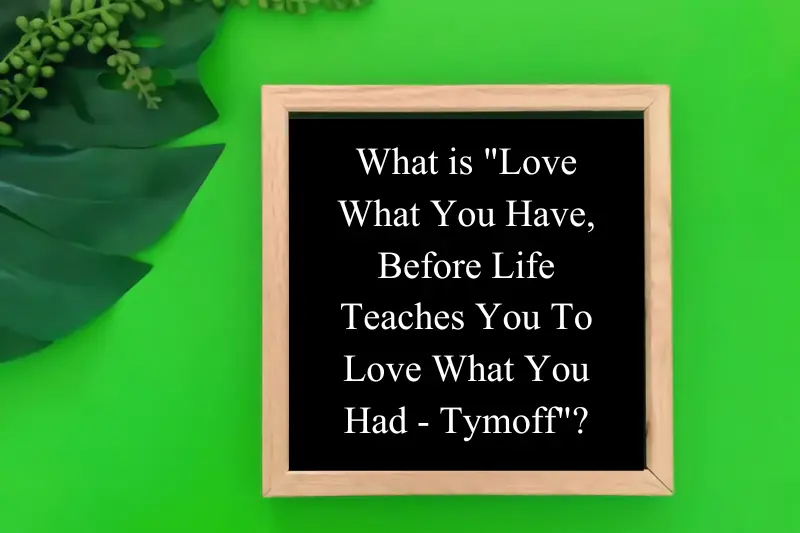Introduction:
Hey there, let’s talk about something important: “Love What You Have, Before Life Teaches You To Lov – Tymoff“. It’s a mouthful, I know, but bear with me because it holds a world of wisdom.
In this rollercoaster called life, we’re often too busy chasing the next big thing to stop and appreciate what’s already in our hands. But what if I told you that by loving what you have right now, you’re not just finding contentment, but also preparing yourself for whatever life throws your way?
So, buckle up as we dive into the depths of this powerful concept. We’ll explore why it’s crucial, how it can transform your life, and yes, we’ll even give you some practical tips to start living it out. Ready? Let’s embark on this journey together.
What is “Love What You Have, Before Life Teaches You To Love What You Had – Tymoff”?

Alright, let’s break it down in simple terms. Imagine you have a favorite toy, something you really cherish. You play with it every day, but sometimes you forget just how much it means to you. Then, one day, it breaks or gets lost, and suddenly you realize how much you loved it.
That’s what “Love What You Have, Before Life Teaches You To Love What You Had – Tymoff” is all about. It’s a fancy way of saying that we often take things for granted until they’re gone. Instead of waiting for something to disappear before appreciating it, this concept encourages us to value and cherish what we have right now.
It’s like having a delicious meal in front of you but not truly savoring each bite until it’s almost finished. Life is full of wonderful experiences, relationships, and blessings, but if we’re not careful, we might miss out on enjoying them to the fullest.
So, in simple terms, “Love What You Have, Before Life Teaches You To Love What You Had – Tymoff” reminds us to treasure the present moment and all the good things in our lives before it’s too late. It’s about finding happiness and gratitude in what we already have, rather than constantly longing for something else.
Why is This Important?
Appreciating the significance of “Love What You Have, Before Life Teaches You To Love What You Had – Tymoff” is essential for leading a fulfilling and meaningful life. Here’s why:
- Cultivates Gratitude: When we focus on loving what we have, it cultivates a sense of gratitude for the blessings in our lives, big and small.
- Fosters Contentment: Embracing this mindset promotes contentment with our current circumstances, reducing the tendency to constantly chase after more.
- Strengthens Relationships: By appreciating the people in our lives and the moments we share with them, we nurture stronger, more meaningful relationships.
- Reduces Stress and Anxiety: Adopting an attitude of gratitude and appreciation can help alleviate stress and anxiety by shifting our focus from what’s lacking to what’s abundant.
- Encourages Mindfulness: It encourages us to be present in the moment and mindful of the beauty and joy that surrounds us, enhancing our overall well-being.
- Builds Resilience: By learning to appreciate what we have, we become more resilient in the face of challenges and setbacks, knowing that we have the strength and resources to overcome them.
In essence, “Love What You Have, Before Life Teaches You To Love What You Had – Tymoff” is important because it reminds us to cherish the present, be grateful for what we have, and find contentment in the here and now.
You may also like it.
9 Wonderful Ways to Get More Followers On Chingari [2024]
The Spongegirl Case – How It Happened – Secrets Behind It – Blog Angle
Top 10 Best Instagram Tips and Tricks You Should Know [2024]
Love What You Have, Before Life Teaches You To Love What You Had – Tymoff: Step-by-Step Guide

Start Your Day with Gratitude:
- Take a moment each morning to reflect on three things you’re grateful for. It could be as simple as a sunny day, a warm cup of tea, or the love of your family.
- Write them down in a gratitude journal or simply say them out loud to yourself.
Practice Mindfulness Throughout the Day:
- Be present in the moment and fully engage with whatever you’re doing, whether it’s eating a meal, talking to a friend, or taking a walk.
- Notice the sights, sounds, and sensations around you without judgment or distraction.
Let Go of Comparisons:
- Avoid comparing your life, possessions, or achievements to others. Remember that everyone’s journey is unique, and what matters most is how you feel about your own life.
- Focus on your own strengths and accomplishments, and celebrate them without measuring them against someone else’s.
Embrace Imperfections:
- Accept that life isn’t perfect and neither are you. Embrace your flaws and mistakes as opportunities for growth and learning.
- Practice self-compassion and treat yourself with kindness, especially when things don’t go as planned.
You should also like it.
Trendzguruji.me Awareness: Your Comprehensive Guide – Complete Overview
Trendzguruji.me: Awareness, Computer, Cyber & Health & Beauty Guide
The Spongegirl Case – How It Happened – Secrets Behind It – Blog Angle
Prioritize Meaningful Connections:
- Spend quality time with the people who matter most to you – your family, friends, and loved ones.
- Make an effort to truly listen, connect, and create lasting memories with them.
Seek Joy in Simple Pleasures:
- Find happiness in the little things that bring you joy, whether it’s reading a book, going for a bike ride, or watching the sunset.
- Appreciate the beauty and wonder of everyday life, and don’t overlook the moments of joy that surround you.
Reflect on Your Blessings:
- At the end of each day, take a few moments to reflect on the blessings in your life.
- Think about the good things that happened, the people who made you smile, and the opportunities you had.
By following these simple steps, you can gradually cultivate a mindset of gratitude, contentment, and appreciation for the things you have in your life right now. Remember, “Love What You Have, Before Life Teaches You To Love What You Had – Tymoff” is not just a saying – it’s a way of living that can bring more happiness and fulfillment into your life.
Advantages and Disadvantages of “Love What You Have, Before Life Teaches You To Love What You Had – Tymoff”
Advantages:
- Increased Happiness: Appreciating what you have fosters a sense of contentment and gratitude, leading to greater overall happiness in life.
- Better Relationships: Valuing the people in your life and cherishing moments with them strengthens relationships, deepens connections, and fosters a sense of belonging.
- Reduced Stress: By focusing on the positives and being grateful for what you have, you can lower stress levels and experience greater peace of mind.
- Enhanced Well-being: Adopting an attitude of gratitude and appreciation promotes mental and emotional well-being, contributing to a healthier and more fulfilling life.
- Improved Resilience: Appreciating what you have builds resilience, helping you navigate challenges with a positive outlook and a belief in your ability to overcome obstacles.
- Increased Generosity: Gratitude often leads to a desire to give back and help others, fostering a sense of generosity and kindness towards others.
Disadvantages:
- Potential Complacency: There’s a risk of becoming complacent or settling for less if you’re too content with what you have, potentially hindering personal growth and development.
- Difficulty Embracing Change: Being overly attached to what you have can make it challenging to embrace change or let go of things when necessary, leading to resistance and discomfort.
- Comparison Trap: While appreciating what you have is important, constantly comparing yourself to others who have more can undermine your sense of self-worth and satisfaction.
- Dismissal of Ambition: Excessive focus on gratitude and contentment may discourage ambition and drive to pursue new goals and aspirations, limiting personal and professional growth.
- Risk of Taking Things for Granted: If not practiced mindfully, there’s a risk of taking things for granted and becoming blind to the blessings in your life, leading to a lack of appreciation over time.
- Potential for Guilt: Feeling grateful for what you have while knowing others may not have the same can sometimes lead to feelings of guilt or unworthiness.
While “Love What You Have, Before Life Teaches You To Love What You Had – Tymoff” offers numerous benefits, it’s essential to be mindful of its potential drawbacks and strike a balance between gratitude and ambition in life.
Conclusion:
In the journey of life, learning to “Love What You Have, Before Life Teaches You To Love What You Had – Tymoff” is a powerful lesson that can transform the way we experience the world. By appreciating the blessings in our lives and finding contentment in the present moment, we open ourselves up to a wealth of happiness and fulfillment.
When we cultivate gratitude, we invite more joy and abundance into our lives. By cherishing the people we love, the experiences we share, and the simple pleasures that surround us, we deepen our connections and enrich our relationships. This sense of gratitude not only enhances our own well-being but also radiates positivity to those around us.
However, it’s important to strike a balance. While appreciating what we have is essential, it shouldn’t hinder our drive for growth and improvement. We can still strive for our goals and pursue our dreams while being grateful for the progress we’ve made and the blessings we’ve received along the way.
In essence, “Love What You Have, Before Life Teaches You To Love What You Had – Tymoff” reminds us to live mindfully, appreciate the richness of our lives, and embrace each moment with an open heart. By adopting this mindset, we can find true happiness and fulfillment in the here and now, knowing that the greatest treasures are often found in the simplest joys of life.
FAQs (Frequently Asked Questions)
Q: What does “Love What You Have, Before Life Teaches You To Love What You Had – Tymoff” mean?
A: This phrase emphasizes the importance of appreciating and cherishing what you currently have in your life before it’s too late. It reminds us to value the present moment and the blessings we possess rather than taking them for granted.
Q: How can I learn to appreciate what I have when I desire more?
A: It’s natural to have desires and aspirations, but practicing gratitude can help shift your focus from what you lack to what you already have. Start by consciously acknowledging the blessings in your life, whether big or small, and reflecting on the joy they bring you.
Q: What if I’m struggling to find things to be grateful for?
A: Sometimes it can be challenging to see the positives, especially during difficult times. In such cases, try to focus on the basics – your health, a roof over your head, food on your table. Additionally, consider seeking support from loved ones or a therapist who can help you navigate through these feelings.
Q: Won’t embracing what I have make me complacent and hinder my ambition?
A: While gratitude and contentment are important, they shouldn’t be barriers to personal growth and development. It’s about finding a balance between appreciating what you have and pursuing your goals. Gratitude can actually fuel motivation by reminding you of the progress you’ve already made and the possibilities that lie ahead.
Q: How can I avoid comparing myself to others while practicing gratitude?
A: Comparisons can undermine your sense of gratitude and self-worth. Focus on your own journey and accomplishments, and remember that everyone’s path is unique. Celebrate your successes and strengths without measuring them against others’. Redirect your energy towards appreciating your own blessings rather than envying someone else’s.
Q: Is it possible to be grateful even during tough times?
A: Absolutely. In fact, practicing gratitude during challenging times can be particularly powerful. It helps shift your perspective, allowing you to find silver linings and sources of strength even in the midst of adversity. Look for moments of kindness, support, or resilience that you can be thankful for, no matter how small they may seem.
Extra Points:
Practice Self-Compassion:
- Be kind to yourself, especially when facing difficulties or setbacks. Treat yourself with the same understanding and compassion you would offer to a friend in a similar situation.
Share Your Gratitude:
- Express your appreciation to others. A simple “thank you” or a heartfelt note can brighten someone’s day and strengthen your relationships.
Find Beauty in Everyday Moments:
- Take time to notice and appreciate the beauty in the ordinary – a blooming flower, a child’s laughter, or a stunning sunset. These small moments of wonder can bring immense joy.
Keep a Gratitude Journal:
- Write down three things you’re grateful for each day. Reflecting on these blessings can help shift your focus towards the positives in your life and foster a sense of gratitude.
Turn Challenges into Opportunities:
- View obstacles as opportunities for growth and learning. Instead of dwelling on the difficulties, focus on what you can learn from them and how they can make you stronger.
Give Back:
- Find ways to give back to others, whether through acts of kindness, volunteering, or supporting charitable causes. Helping those in need not only benefits them but also cultivates a sense of gratitude and fulfillment within yourself.
Practice Mindful Consumption:
- Be mindful of how you consume resources and possessions. Consider whether you truly need something before acquiring it, and appreciate the value of what you already have.
Celebrate Progress, Not Perfection:
- Embrace the journey of self-improvement and celebrate your progress along the way. Remember that growth takes time, and every step forward is worth celebrating.
Create Rituals of Gratitude:
- Incorporate gratitude practices into your daily routine, such as saying grace before meals or reflecting on your day before bedtime. These rituals can serve as gentle reminders to appreciate the blessings in your life.
Stay Present:
- Avoid dwelling on the past or worrying about the future. Focus on the present moment and find joy in the here and now. Life is happening right in front of you – don’t miss it by dwelling on what’s behind or what’s ahead.
You may also like it.
How To Use Hashtags On Instagram To Gain Free Followers 2024
How Can I Promote My Instagram For Free – Step-By-Step Guide
How Do I Monetize My Instagram Account In 2024 – Blog Angle
How To Run Ads On Instagram [2024] – Step By Step Guide
How To Get Real Followers On Pinterest [2024] – Natural Tricks
